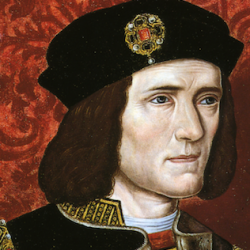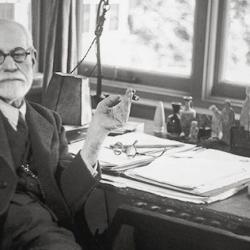Paul Cantor (Shakespeare’s Rome) argues that Shakespeare wrote Coriolanus and Antony and Cleopatra as companion plays, marking the birth of the Republic and its decadent decline in the early empire. As evidence, he points to overlapping themes and literary features, and notes that there is a political and moral degeneration from the earlier to the later play.
There is a great deal of eating and drinking in Antony and Cleopatra (1.2.12-13; 2.7; hereafter A&C) none in Coriolanus (hereafter Cor). Cor begins with a famine, and at no time does a meal occur on stage. and this is connected with the different erotic tone of the two plays. Even when Coriolanus’s wife shows up, she cannot convince him to give up his attack on Rome. Coriolanus follows the example of his mother Volumnia who, invited to supper (4.2.49-51),refuses with “I sup upon myself”! Cor gives us “the image of a world in which men refrain from indulging their desires, either out of necessity or a sense of self-discipline” (23).
Eating and drinking is associated with love in A&C, but the title hero of Cor is isolated from all eroticism as well as commensality. Cantor cites Julius Caesar 4.3.158-62, and comments, “When Brutus and Cassius reach out for the bowl of wine they are metaphorically reaching out for each other’s love. This symbolic connection between love and drinking wine is a relatively isolated example in Julius Caesar. When, in Antony and Cleopatra, the instances of eating and drinking begin to add up, clearly associated with the love affair of the main characters, they contribute to a pervasive erotic atmosphere that is a defining characteristic of the play.” The exclusion of eating and drinking from Cor “helps build up its nonerotic, austere atmosphere” (22) and emphasizes the isolation of its title character.
A&C‘s eroticism and sensuality fits its eastern, Orientalist, Egyptian setting. The play works with a stereotypical contrast of Roman steadiness and Egyptian luxury. But Rome is as voluptuous as Egypt. The most prominent feast scene is Roman, not Egyptian (2.7). Octavius talks temperence and abstinence (2.7.102-3), but he’s drunk when he gives the speech. Romans become “Egyptianized” in the play: “The Rome-Egypt contrasts are developed largely in the first half of the play, and start to become blurred toward the middle, as the geographic scope of the action widens. . . . Precisely because of this free interchange between regions, distinctions like Rome versus Egypt begin to lose their absoluteness. In point of fact, the Rome and Egypt of the play are becoming assimilated to each other as a result of their encounter and interaction” (25-6; cf. 2.1.23-27; 2.2.176-83; 2.6.63-65; 2.7.96). Rome wins the military conflict but “Egypt is prevailing in what would today be called the ‘peaceful cultural competition’ between the nations” (26). Antony comes to Cydnus as a victor, but Cleopatra is ultimately triumphant (2.2.184; 2.2.220-6).
Shakespeare is dealing in ancient commonplaces. He “could portray an austere Rome, but he knew that by the time at which A&C takes place an austere Rome was a thing of the past. We must be awake to the possibility that, for Shakespeare, Roman as a term of distinction means primarily Republican Roman, and that with the death of the Republic, true Romanness in Shakespeare’s view begins to die out also” (27). The point is sharpened by contrast with Cor, where Coriolanus’s abstinence signifies his spirited desire to serve Rome, even at great personal loss. His food is to serve the city. The Republic needs precisely this kind of man to survive and flourish: “A man governed by his self-interest will not jump at the opportunity of risking his life. . . . Pride, on the other hand, with its indifference to the demands of the body, is capable of rising above narrowly conceived self-interest and serving the public interest. By considering the needs of the city in wartime we begin to see the connection between austerity and heroic or martial virtue” (35). Coriolanus is governed by a “complex of austerity, pride, heroic virtue, and public service” (37), a complex that has all but dissipated by the time of the conflict between Antony and Octavius.
The loss of sturdy Republican virtue is partly a product of the new political situation. Caesar’s preference for “fat men” (Julius Caesar 1.2.192-210) is a preference men who do not have the spirited pride of a Coriolanus: “Caesar concludes that it would further his own imperial ambitions to encourage eros and discourage spiritedness. As Caesar himself indicates, Antony is the sort of man with whom an Emperor could feel comfortable, since most men dominated by eros find their satisfaction outside of politics, and are content to be ruled by someone above them. The ‘spare Cassius,’ on the other hand, does not indulge himself in food or plays and music the way Antony does, and could not be placated by an imperial policy of bread and circuses” (39-40). Republican Rome fosters spiritedness because everyone checks the ambitions of everyone else. Spiritedness fosters competition for service to the city: “Subordinates hope to rise to positions of authority by proving their courage and ability, while commanders must remain alert to opportunities for glory if they are not to be eclipsed by men who serve under them.” The republican system keeps bringing new men into the mix.
Empire, by contrast, suppresses ambition, as the emperor views every ambitious man as a potential threat and rival. “Because in the Empire a commander generally gets credit for his subordinates’ accomplishments, the advantage is with those already in power, and the temptation for a commander to rest on his laurels is much greater than it is in the Republic. At the same time, for men trying to make their fortunes in the world, the inducement to perform heroic and glorious deeds for Rome is much less. . . . Preferment in the Empire is achieved through maintaining the good graces of one’s commander, whatever the cost to Rome as a whole. The Republic seeks to establish a harmony between the interest of the individual and the interest of Rome, which in turn creates salutary competition for honors among subordinates and commanders” (43-4). There is a harmony of interests between subordinates and commanders, but that disrupts the harmony of interests between the individual Roman and Rome itself: “The Empire actually discourages public spiritedness by failing to provide legitimate paths for advancement to the top of the Imperial hierarchy. In the Empire there is room fro only one man at the top at a time, as the course of action in A&C amply demonstrates, and unlike the Republican consul, the Emperor does not quietly step down from office after a year’s term” (45). The rigidity of the structure “works to redirect the energies of men from public to private life. Once the world of politics loses its glory, the world of eros can take on a new glamor” (45).
Two scenes will make the contrast of the two plays, the two Romes, the two politics. Cantor compares the speech of Coriolanus’s mother Volumnia (Cor 5.3.104-13) with that of Octavius’s sister Octavia (A&C 3.4.12-20). He observes, “Volumnia and Octavia are in fundamentally different situations. Volumnia is torn between love for her country and love for her son; Octavia is torn between love for her husband and love for her brother. A conflict between public and private loyalties has been replaced by a conflict between two private loyalties” (46-7). Volumnia judges her son by service to Rome and concludes in favor of Rome because a man who attacks Rome cannot truly be her son (5.3.178-80. Rome’s gods take precedence over household gods. Octavia, by contrast, doesn’t even mention the city in her speech.
The opening scenes of the plays also highlight the difference of the two plays: Cor “begins in the everyday world of the city, A&C in a lavish imperial court remote from the cares of daily life. In the first scene of Coriol., the most elementary of human desires – hunger -cries out for satisfaction, but it is unclear from the opening scene of A&C what exactly its characters are hungry for. Antony speaks as if mere feeding were beneath him . . . his longings are evidently more complicated than those of ordinary men and so perhaps more difficult to fulfill. His concern is not with need but with pleasure, more specifically, with an endless succession of momentary pleasures (1.1.46-7). Whereas Coriol. begins in an atmosphere of necessity and urgency, with Rome plagued by famine and open revolt, A&C begins in an atmosphere of luxury and languor, with the hero dismissing news from Rome and idly wondering: ‘What sport to-night?’ (1.1.47)” (50-1).














